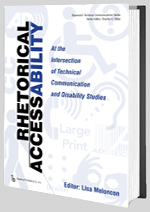Rhetorical AccessAbility Reviews Posted
 This post is a second trailer for a new book ‘Rhetorical AccessAbility: At the Intersection of Technical Communication and Disability Studies’, edited by Lisa Meloncon at the University of Cincinnati to be released later this year. I penned a chapter for this book in collaboration with Henny Swan, Senior Accessibility Specialist at the BBC. Together we consider ‘Web Standards and the Majority World’, taking a socio-cultural look at the values that web standards convey to a global audience. In particular we were interested in examining the ways in which Web Standards can export Minority (that is developed/Northern/post-industrial) notions of disability to the Majority world, with potentially counter-productive results. We make our arguments by attending closely to Web Standards as a form of technical writing through the lens of critical disability studies and research.
This post is a second trailer for a new book ‘Rhetorical AccessAbility: At the Intersection of Technical Communication and Disability Studies’, edited by Lisa Meloncon at the University of Cincinnati to be released later this year. I penned a chapter for this book in collaboration with Henny Swan, Senior Accessibility Specialist at the BBC. Together we consider ‘Web Standards and the Majority World’, taking a socio-cultural look at the values that web standards convey to a global audience. In particular we were interested in examining the ways in which Web Standards can export Minority (that is developed/Northern/post-industrial) notions of disability to the Majority world, with potentially counter-productive results. We make our arguments by attending closely to Web Standards as a form of technical writing through the lens of critical disability studies and research.
Publishers Baywood have listed Rhetorical Accessibility as available for pre-order as part of their Technical Communications Series (Edited by series editor Charles H. Sides). Their pages include the publishers’ book summary and target audience information which I’ve previously blogged about. Further details are now available, however, including the front cover (pictured above), profiles of all the authors and the following reviews in praise of the book.
Rhetorical Accessability is an important book, not only because it elucidates a range of critical work being done at the intersection of technical communication and disability studies, but, more importantly, because it demonstrates convincingly how work in these areas—which some still consider highly specialized concerns—directly affects every one of us, every day, whether we know it or not. By foregrounding the productive interplay of theories from disability studies and technical communication, the authors highlight how issues of inclusive content, accessible design, medical discourse, and technological embodiment are at work in all of our daily lives. In so doing, Rhetorical Accessability represents a major step toward a broader field of writing studies, toward work on crucial issues in writing that span personal, academic, civic, and professional discourses, that unite scholars of rhetoric, composition, technical communication, literacy studies, linguistics, and other fields.
Paul Heilker, Director of the PhD in Rhetoric and Writing, Virginia Tech.
On every page, this groundbreaking collection—the first of its kind in the field of technical communication—reminds us that disability studies deserves to play a central role in our pedagogies, workplace practices, and scholarship. Lisa Meloncon has assembled an excellent, wide-ranging collection of chapters from both established experts and new scholars. The topics and theoretical lenses are diverse and broad. The chapters are deeply grounded and well-informed. They combine theory and practice in true tech comm fashion. The coverage of web accessibility is excellent, comprising multiple chapters and topics (e-readers, laws, guidelines, accessibility statements, online writing instruction). I’m already planning to add this book to the list of required readings for my graduate course in Web Accessibility and Disability Studies.”
Sean Zdenek, Associate Professor of Technical Communication and Rhetoric, Texas Tech University.